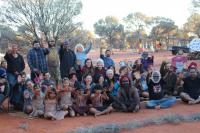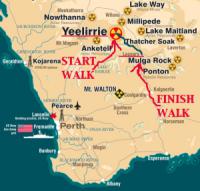A group of Aborigines and foreigners from seven other countries have completed a 450-kilometre walk in the West Australian outback to protest against uranium mining. The Walkatjurra Walkabout, which started in 2011, finished its 5th walk in the North Eastern Goldfields town of Leonora on 15 September. A collaboration of Aboriginal and non-indigenous people, the walk is a moving community protest against the proposed uranium mines in the region. The month long walk, lead by local Traditional Owners, covered almost 450 km’s from Wiluna to Leonora, passing Toro Energy’s Wiluna uranium mine proposal at Lake Way and Cameco’s proposed uranium mine at Yeelirrie Station.
Walk participants included local Traditional Owners, people from Australia, Japan, Taiwan, England, Sweden, Aotearoa (New Zealand), America and France. The walks continue to attract people interested in learning about Aboriginal culture, caring for country and to share a united vision for a nuclear free world.
The walk was also joined at Yeelirrie for two days by Federal Greens senators Rachel Siewert and Co-Deputy Greens leader Scott Ludlam along with state Greens MLC Robin Chapple. The visit included a tour of Toro Energy’s uranium project at Lake Way near Wiluna with walkers and Toro Energy.
Many of the participants have first hand experience of the dangers of the nuclear industry, especially those from Japan and Taiwan, whose nuclear industry are fuelled by Australian uranium.
Local Traditional Owner Vicky McCabe from Leonora, who walked the whole way said “We have been walking for five years against these Uranium mines, and we will continue to walk and invite people to our country to tell Toro and Cameco that there is no way they will be taking this poison out of our country.”
Mandjindja Koara woman Sandra Evans said “You would think that the government and mining companies would have learnt from the lessons of Hiroshima, Fukushima and Chernobyl. This poison has done nothing but killed and hurt millions of people. Uranium is deadly, we have always known that, it should stay in the ground where it is.
Koara Tribal Leader, Richard Evans said “As the traditional owners of our land we have never consented to allow the Australian Government, State Government or mining companies to come here and dig up our country, we assert our sovereign rights to care for our land and to stop this destruction. How long do we the Aboriginal owners of the land have to demonstrate that we do not want in any way this uranium to be taken out of our country, and then sent overseas to poison some other peoples country.”
The Walkatjurra Walkabout is a celebration of Aboriginal culture and community resistance to the nuclear industry with the aim to keep Western Australia nuclear free.
For more information please contact: Marcus Atkinson – 0400505765
Click here for an earlier linksunten report on the the walk; scroll down to the “Kommentar” section.



More Aboriginal news
New West Australian laws to sentence more young offenders
More Indigenous youth could end up behind bars in Western Australia as a result of new laws introducing additional mandatory sentences for 16-and 17-year-olds found guilty of non-violent home invasion and burglary, Amnesty International has warned.
Harmful law will put more Indigenous kids in - rather than out - of prison
A Bill that passed the Western Australian Legislative Assembly will have a disastrous impact on Indigenous young people, said Amnesty International. Indigenous people, who are already massively over-represented in WA’s prisons, will be further disadvantaged by these laws.
Tweet against mandatory sentencing for kids
It feels like a kick in the guts that this bill has passed -- especially as it went unopposed by WA Labor who "unequivocally" oppose mandatory sentencing. Join us in Tweeting and Facebooking WA Members of Parliament to let them know we’re disappointed in their decision.
Decolonising Australian psychology
Colonisation has had a devastating and lasting impact on the wellbeing of Aboriginal and Torres Strait Islander peoples in Australia.
A paper published in the internationally edited Journal of Social and Political Psychology (JSPP) discusses the role of psychology in Australia and the negative impact certain disciplinary theories and practices have had on indigenous Australians.
The impact has been further exacerbated by the failure of mainstream policy makers and mental health practitioners to recognise the key, distinctive cultural and social determinants that contribute to Aboriginal health and wellbeing.
There is a growing response by Aboriginal psychologists, critical social theorists, and their allies to decolonise psychological theory and practice to redress this situation.
Written by Professor Pat Dudgeon, the first Aboriginal psychologist to graduate in Australia, and Professor Roz Walker, the paper outlines key decolonising strategies that have been effective in interrupting those aspects of psychology that are inimical to Aboriginal wellbeing.
Both authors are with the University of Western Australia, Dudgeon at its School of Indigenous Studies, Walker at its Centre for Research Excellence in Aboriginal Health and Wellbeing.
The paper is titled “Decolonising Australian Psychology: Discourses, Strategies, and Practice”.
Yeelirrie - the fight is just beginning (see story above)
Posted by Mia Pepper
MEDIA RELEASE
21st September 2015
Yeelirrie - the fight is just beginning
Western Australian and national environment organisations have reinforced their strong opposition to the planned Yeelirrie uranium mine, following the release of Cameco’s Public Environment Review (PER).
Dave Sweeney, Nuclear Free Campaigner from the Australian Conservation Foundation, said Cameco have clearly stated that uranium projects are not feasible with the current uranium price. The release of the PER is about a paper approval, this project is a long way from a done deal.
“There is longstanding and ongoing opposition from many Aboriginal people and other stakeholders. Seeking to advance a project that is not viable and where the company has no short to medium term development plans is reckless and unreasonable.”
The Walkatjurra Walkabout (see report above) just weeks ago walked through Yeelirrie and heard very moving testimonies from local pastoralists and Aboriginal elders who are united in the opposition to the project.
Mia Pepper from the Conservation Council of WA said “This is a ‘smash and grab’ that totally disregards the concerns of the community and does little to minimise environmental damage. Cameco plan to cut the life of the mine in half by doubling the impact area and the risk of dust compared with previous plans for the ore body.”
Canadian-owned Cameco has a shocking record overseas and face court in Canada and the US this year over tax avoidance charges.
The company’s operations in Canada have been criticised by Canadian regulators who have said, “When you put the pieces together, they build a story of really fundamental issues about the competence of the company,'' commented Prof. Christopher Barnes, geologist and Canadian Nuclear Safety Commission member, in 2003.
From the company’s website: “Cameco is one of the world's largest uranium producers accounting for about 16% of the global production from its mines in Canada, the US and Kazakhstan.”
For further comment:
Dave Sweeney 0408317812
Mia Pepper
Nuclear Free Campaigner
Conservation Council WA
0415 380 808
mia.pepper@conservationwa.asn.au
2 Delhi St, West Perth, WA 6005
Music giants team up for threatened remote communities
Four Australian music giants - including Aborigines Archie Roach and Emma Donovan - have banded together to record new versions of two classic Indigenous tracks, Blackfella/Whitefella by Warumpi Band and Roach’s Down City Streets. Sale proceeds will go to SOS Blak Australia and a nationwide movement to support remote Indigenous Australian communities, including those under threat from an end to government funding in Western Australia. ‘It’s important that we keep people on country,’ Roach says, ‘because country keeps us safe, keeps us strong’.
Hear them explain what they’re doing, and part of one of the songs, in this video.
See past linksunten coverage of the remote communities issue:
Remote Indigenous outstation rejects Australian government policy and opens own school
Protests in major Australian cities against cuts to Aboriginal services & closure of Aboriginal communities
West Australian plan to close 100 remote and Indigenous communities 'devastating'
Closure of remote communities devastates Aboriginal residents
Maori politicians support Aboriginal protest over proposed closure of indigenous communities
Aboriginal Australian communities send a powerful message to government
South Australian Aboriginal communities hold emergency summit to fight 'cultural genocide'
International anger swelling at plans to evict Australian Aborigines from ancestral lands
French researchers: “Aboriginal communities should not be closed!”
Aborigines appeal to UN indigenous forum over homelands closure plans
Aboriginal Australian communities announce a global call to action
Stop the forced closure of Aboriginal communities in Australia -- Call-to-Action day!
'Systemic racism' against Aboriginal communities is savaged at the United Nations
By evicting the homelands, Australia has again declared war on Indigenous people
Government cuts off water to remote Australian Aboriginal settlement